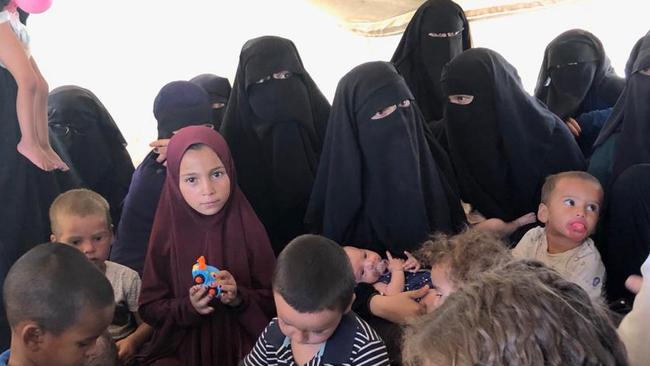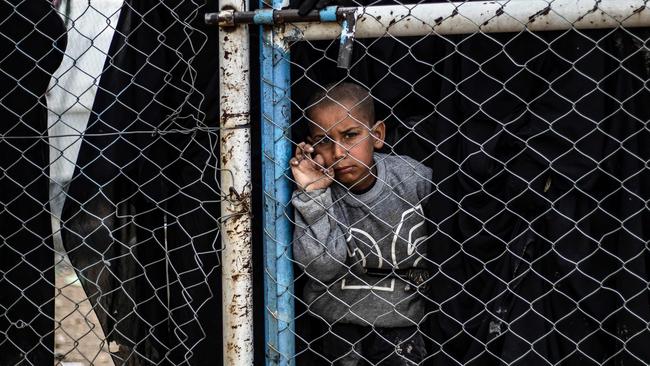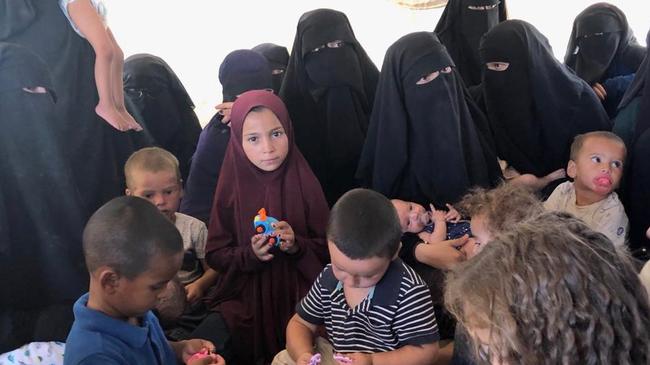Ellen Whinnett: Islamic State kids a moral, legal and political dilemma
The issue of what to do with children in Islamic State camps is an issue troubling Western democracies across the globe, but one we can’t ignore, writes Ellen Whinnett.

Opinion
Don't miss out on the headlines from Opinion. Followed categories will be added to My News.
What to do with the children of Islamic State — the children born to parents who fought for, or supported in some way, the evil terror group in Iraq and Syria — is an issue troubling Western democracies across the globe.
There are thought to be about 1500 children who hold foreign citizenship being held at camps around northeastern Syria since the fall of the IS caliphate in March. About 44 Australian children are living at the giant al-Hawl camp with about 22 Australian women. It’s a tiny number, but the problems with getting them out are huge.
There are at least four key issues governments have to consider when deciding on the future of these children — the moral, legal, logistic and political implications.
Let’s start with the easiest, the logistic issues. While it is dangerous in the region, and the situation has deteriorated in recent weeks after the US withdrawal and Turkish incursion, it is still possible for officials to visit the camps.
The Red Cross and Syrian Red Crescent are working in al-Hawl and other camps.
Western officials can move across the Iraqi border and transfer the children through Erbil, the capital in the Kurdish north of Iraq. The children don’t have passports, but that can be arranged easily.

On then to the legal problems. In some cases, children have been born to foreign mothers and their Australian fathers have been killed fighting. Those children are entitled to Australian citizenship through their fathers. But to prove their heritage requires the Australian government to track down the men’s families, sometimes in Iraq and Syria, and acquire DNA to prove the child is theirs. It’s an almost impossible task. The children’s mothers are not automatically entitled to Australian citizenship.
So, if the child is entitled to Australian citizenship, should they be forcibly removed from their mothers? On Australian soil, in extreme cases of neglect or abuse, the courts can order children removed from their biological parent if child protection agencies provide appropriate evidence. But no such laws apply in Syria and it cannot be done even if the government wanted to, and there’s no evidence the government is interested in such a tactic.
Some children are being repatriated. In June, six children were flown to Belgium, 12 to France and two more were handed to the Dutch government. Two Austrian toddlers were flown out last month. Australia has removed eight children from Syria.
All the children had something in common. They were orphans.
Western democracies, with strong rules of law, have found it is much easier to repatriate children whose parents have been killed.
Which brings us to the political dilemma.
Elected governments have many responsibilities and one of the most important is to protect its citizens from harm. Research has shown that between 1990 and 2010, 30 Australians supporting al-Qaeda, the forerunner to Islamic State, went to Pakistan and Afghanistan to fight or to train in the group’s camps. Of those, 23 came back to Australia and 19 engaged in behaviour that concerned Australia’s security agencies. Eight were later convicted of terror offences.
Of course, they were adults. The vast majority of the ISISkids in the camps were born since 2013.

But others were older when they were taken there and have spent years living under IS rule, with fathers, and potentially mothers, who supported the ideology. It is likely those children, young as they are, are radicalised and will pose a security threat.
The difficulties reintegrating them into Australian society will be enormous. In Australia, the age of criminal responsibility across all states, territories and federal laws is only 10 years of age. Which means Australia accepts some children can commit very serious crimes. Can the country risk bringing the older children back?
The most common scenario in the camps is very young children living with their Australian mothers. Regardless of who their fathers are, those children are Australian through their mother’s citizenship. They are mostly babies and toddlers and pose no threat. But their mothers are almost certain to have adverse security assessments made against them by Australia’s intelligence agencies. In other words, they’re deemed to pose a threat.
And so to the moral dilemma. What responsibility does Australia bear? Are these children cubs of the caliphate, born to continue an evil ideology opposed to Western values of religious freedom, gender equality and secular rule of law? Or are they children stuck in appalling conditions, victims of decisions made by their parents? It’s clear Australians have little sympathy for the women in the camps. But the mood is not so easy to read on the children. The fact is, these children could die from disease, or be killed, while in the camps.
Aside from humanitarian considerations, we should also consider the security implications.
Right now, the children are being held in squalid camps, surrounded by tens of thousands of families who were committed to Islamic State. Those old enough to attend school are often being educated in IS-influenced classrooms.
IS’s morality police roam the camps. The circumstances are absolutely ripe to breed the next generation of extremists, which is why America, Australia’s most important security partner, is pressuring all members of the anti-IS coalition, including Australia, to get the foreign fighter families out of Syria immediately.
Ellen Whinnett is national politics editor.
